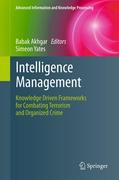
Intelligence management: knowledge driven frameworks for combating terrorism and organized crime
Akhgar, Babak
Yates, Simeon
The current rapid development in both computing power and the ability to present and mine complex data sets in useful ways provides the backdrop to Intelligence Management: Knowledge Driven Frameworks for Combating Terrorism and Organized Crime. The chapters address the linkage between: law enforcement; developments in information and communication technologies and key ideas about the management of data, information, knowledge and intelligence. The work is conducted by a number of international academic and industrial research groups, law enforcement agencies, and end users. Section 1 presents four chapters that address the details, outcomes, user needs and background theoretical ideas behinda large-scale research aand development project in this domain (The Odyssey Project). This project explored the challenges of establishing a Pan-European ballistics and crime information intelligence network. It represents an exampleof the type of system that is likely to become commonly used by Law Enforcement Agencies in the near future. Many of the challenges are not technical but organisational, legal, economic, social and political. Sections 2 and 3 therefore present wider commentaries. Section 2 explores other research and development projects that attempt to exploit the power of contemporary ICT systems to support Law Enforcement Agencies in many aspects of their work including investigations, data analysis and presentation, identification, training and crime prevention. Section 3 takes a look at the social and organisational issues around aspects of crime prevention, crime detection and policing – with a view to the role of information and communication technologies in these contexts. Address the linkbetween law enforcement, the uses of and developments in information and communication technologies (ICTs) and key ideas about the management ofinformation, intelligence and knowledge in this domain. Analyses the details,outcomes, user needs and background theoretical ideas behind the Odyssey Project. Contributions from a wide range of researchers and from the Odyssey team. INDICE: Introduction.-The Odyssey Project-Understanding and Implementing User Needs in the Context of Ballistic Crime Data Exchange.-Secure Architecture.-Interoperability-A Requirement for Tackling Gun Crime.-How Complexity Theoryis Changing the Role of Analysis in Law Enforcement and National Security.-Technolgoies for Strategic Intelligence Management.-Data Management Techniques for Criminal Investigations.-Fast 3D Recognition for Forensicsc and Counter-Terrorism Applications.-Simulations for Crisis Management-PANDORA's Box.-Choices and Voices-A Serious Game for Preventing Violent Extremism.-Social, organisational and policy aspects of ICT and strategic intelligence management.-Strategic Intelligence Management for Combating Crime and Terrorism.-Human Trafficking-The Importance of Knowledge Information Exchange.-Cybercrime Profiling and Trend Analysis.-Up Close and Personal - The Interplay between Information Technology and Human Agency in the Policing of the 2011 Sheffield Anti-Lib Dem Protest.-Police Learning Strategies.-Conclusions - technolog, society and law enforcement agencies.
- ISBN: 978-1-4471-2139-8
- Editorial: Springer London
- Encuadernacion: Cartoné
- Páginas: 224
- Fecha Publicación: 31/08/2011
- Nº Volúmenes: 1
- Idioma: Inglés
